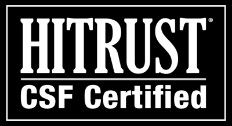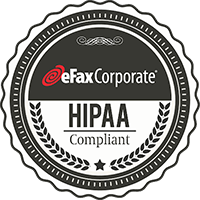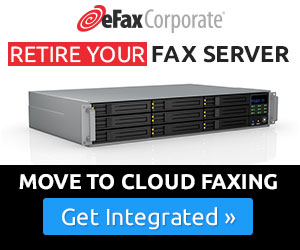The real estate industry remains vulnerable to data-security lapses, particularly where sensitive data is intentionally or unintentionally breached by unauthorized personnel.
Firms that fail to improve the security and regulatory compliance of their operations will likely face legal and industry consequences:
• Corrective disciplinary action
• Resolution agreements
• Fines
• Criminal penalties
• Litigation
Let’s look more closely at the problem of security breaches and non-compliance, and explore cloud-based solutions to this problem.
Community Fax Machines: A Security Threat
Perhaps one of the most important threats from the community fax machine is non-compliance. According to a 2012 survey from research firm Opinion Matters, nearly half of all faxes in the U.S. are breached by unauthorized personnel.
A common data-breach scenario occurs when sensitive data is left on a community fax machine: without physical or environmental security, the machine creates an increased risk for data breaches. Because community fax machines are not tightly controlled in the same way as digital accounts, firms must upgrade their technology to enhance the security and privacy of their fax infrastructure.
Say an agent approaches a community fax machine and notices a confidential customer finance report lying out in the open. Needing to quickly transmit a counter-offer to a client in a different time zone, the agent gathers the confidential report from the fax machine and dumps it onto a top tray overrun by papers. The tray drops to the floor and the report comes out of order in a scatter on the floor. Multiple confidential client documents are exposed during the mess, and the firm is at risk of violating customer confidentiality.
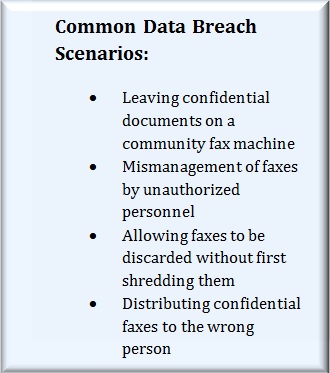
Regardless of how or why a data breach occurs, the truth of the matter is that the standalone fax machine—with its open-end layout and fully exposed paper trays—cannot protect sensitive data from breaches or physical theft. Unauthorized personnel have not only the capacity to breach sensitive data, but also to copy, photograph and/or leak it to third parties, such as the media, using any Web-enabled device, including a watch phone.
The industry recognizes its vulnerability to dangerous data breaches, and firms of all sizes are looking to cloud faxing as the preferred solution for solving the problem.
Companies that are not compliant, however, will need to bring their operations in line with 21st century requirements swiftly to avoid fines and other litigation.
Below are the top three benefits of cloud faxing:
1. Modernization
It’s no secret that real estate and mortgage professionals have to send and receive sensitive data on an ongoing basis. From inspection reports, credit checks, invoices and finance forms to punch lists, authorizations and tax information, the real estate industry is tasked with securely handling a high volume of red tape.
What companies must realize, however, is that there is a substantial price to pay for failing to comply with the data security and privacy laws that govern data privacy, record keeping and reporting across the industry.
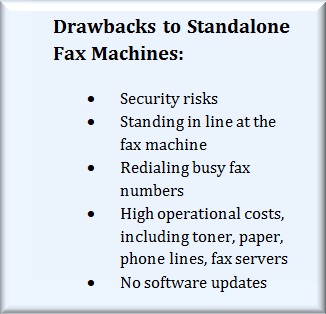
As regulatory requirements escalate, companies will, no doubt, have to adopt safer and more secure methods for transmitting, archiving and organizing their sensitive data. If they do not, they will face stiff fines and other legal penalties, as well as invite an influx of red tape from non-compliance hearings and other corrective procedures.
As companies across the industry upgrade from analog faxing to a cloud solution, questions arise concerning how to incorporate this new technology into an existing operation.
Like any enterprise switching from analog faxing to a hosted, cloud-based fax solution, you will want to know how the new technology is installed and readied for use.
As with corporate email, cloud faxing is streamlined so almost anyone can use it. The set-up process takes just minutes to complete, and there is no expensive hardware to lease or purchase. As long as your staff knows how to send and receive emails, additional training is not needed.
2. Boost Company Responsiveness
A cloud faxing solution not only enhances security and data privacy, but it boosts responsiveness, as well.
From confidential contracts and acknowledgments to high-resolution property pictures, the cloud offers fast, convenient and reliable data transmission, anywhere.
That means no more waiting in line. No more dealing with a busy signal. And no more sifting through reams of paper to send a confidential financial report or other sensitive data.
With cloud technology, sending and receiving faxes is quick, convenient and straightforward. Faxes are sent via email attachments using common file types (.tif, .pdf, .efx). Sensitive data can safely and securely reach any Web-enabled device for immediate transmission of time-sensitive data.
Agents who spend time on the road can send and receive faxes from their cell phones or laptops, enabling them to close deals faster while keeping with federal regulatory requirements.
3. Reduced Fax Costs
Cloud faxing services enhance the security of your fax infrastructure, while at the same time saving your firm money.
First, there is no hardware to install or expensive overhead costs. Initial set-up is easy and administrative controls are managed online for reduced paper waste and minimum IT involvement.
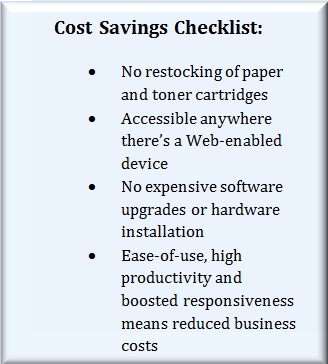
The account administrator can add new fax numbers or administrators based on company need. Similar to email, most fax tech issues are easy to resolve, which means the administrator won’t need to waste time troubleshooting system inefficiency.
If a problem does occur, all the administrator needs to do is call the toll-free number provided by the service company and request service.
A cloud fax solution renders obsolete the need for ink and toner cartridges, printer paper, fax servers, fax lines and IT support, saving your firm more than 50% in overall fax costs.
The Future
The community fax machines of yesteryear guarantee secure data transfer. They do not, however, offer physical or environmental protections against data breaches or theft.
When faxes are allowed to lie on a community fax machine—and let’s face it, most of them do—they face an increased risk for serious data breaches. They can be read, copied or distributed by any unauthorized person who takes ownership of them. This is a frightening thought for any enterprise, let alone one that handles sensitive data, such as financial reports, contracts, tax information, loan application, and counter offers.
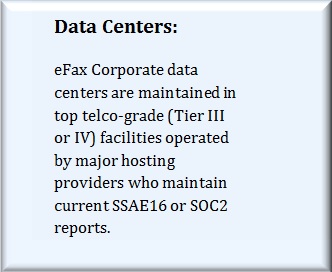
With eFax Corporate, advanced TSL-encryption protects your data during transmission, while 256-bit AES encryption keeps it safe while at rest in your inbox. (Or, you can archive it in a cloud-based repository that is password-protected.)
As an added layer of security, faxes are automatically recorded, stored and organized for auditing purposes. If the successful transmission of any document is ever called into question, the administrator can follow clear audit trails to track its history.
Summary
Cloud faxing lets businesses close deals faster, while keeping them compliant with the data security and privacy laws that govern data privacy, record keeping and reporting.
In the real estate industry – as in industries such as health care and banking – failure to protect sensitive data from unsafe data breaches can be expensive, resulting in multiple fines and court hearings.
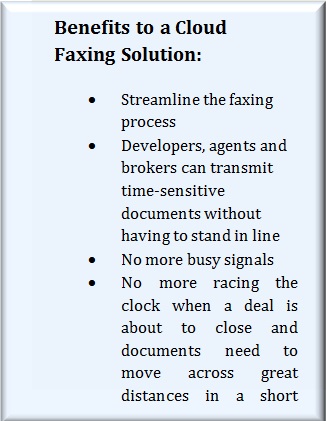
Not only that, but failing to respond to a deal in a timely manner could also pose big risks for the company’s bottom line.
With cloud faxing, agents can send and receive faxes without falling short of regulatory requirements, and save money at the same time.
It’s no secret that the real estate industry is at serious risk for data security and privacy threats. Modern business challenges demand modern solutions to meet that threat head-on.
Cloud-based, paperless hosted faxing services not only keep enterprise organizations compliant, but improves operations for enhanced security and better responsiveness, now and in the future.


